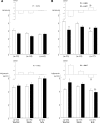Influence of adiponectin gene polymorphisms on adiponectin level and insulin resistance index in response to dietary intervention in overweight-obese patients with impaired fasting glucose or newly diagnosed type 2 diabetes
- PMID: 19131459
- PMCID: PMC2660454
- DOI: 10.2337/dc08-1605
Influence of adiponectin gene polymorphisms on adiponectin level and insulin resistance index in response to dietary intervention in overweight-obese patients with impaired fasting glucose or newly diagnosed type 2 diabetes
Abstract
Objective: The aim of this study was to determine the effect of common adiponectin gene polymorphisms on dietary intervention-mediated changes in adiponectin levels and homeostasis model assessment of insulin resistance (HOMA-IR) indexes.
Research design and methods: A total of 363 subjects with impaired fasting glucose (IFG) or newly diagnosed type 2 diabetes followed a dietary intervention (replacement of cooked refined rice with whole grains and an increase in vegetable intake) and regular walking for 12 weeks without any medication. Adiponectin gene single nucleotide polymorphisms (SNPs) (45, 276, and -11377) were examined in these subjects.
Results: After this dietary intervention, fasting glucose levels decreased in all three SNP 45T>G genotype groups. Subjects with the SNP 45TT genotype showed increased adiponectin levels and decreased HOMA-IR indexes. Haplotype analysis revealed that homozygous carriers of the TG haplotype (45TT and 276GG) and heterozygous carriers of the TG haplotype (TG/X) showed a reduction in the HOMA-IR index after adjustment for baseline levels. Significant differences were observed in changes in HOMA-IR indexes and adiponectin concentrations according to the 45-276 TG haplotype in overweight-obese, but not in normal-weight subjects: the greatest decrease in HOMA-IR indexes and the greatest increase in adiponectin levels were shown in overweight-obese subjects with the TG/TG haplotype.
Conclusions: ADIPOQ genetic variants can affect circulating adiponectin levels and insulin resistance indexes in subjects with IFG or newly diagnosed type 2 diabetes in response to dietary intervention.
Figures

 P < 0.05 compared with the TG/TGhaplotype and * P < 0.05 compared with the TG/X haplotype tested by ANOVA with the Bonferroni method.
P < 0.05 compared with the TG/TGhaplotype and * P < 0.05 compared with the TG/X haplotype tested by ANOVA with the Bonferroni method.References
-
- Takahashi M, Arita Y, Yamagata K, Matsukawa Y, Okutomi K, Horie M, Shimomura I, Hotta K, Kuriyama H, Kihara S, Nakamura T, Yamashita S, Funahashi T, Matsuzawa Y: Genomic structure and mutations in adipose-specific gene, adiponectin. Int J Obes Relat Metab Disord 24: 861– 868, 2000 - PubMed
-
- Vionnet N, Hani EH, Dupont S, Gallina S, Francke S, Dotte S, De Matos F, Durand E, Leprêtre F, Lecoeur C, Gallina P, Zekiri L, Dina C, Froguel P: Genomewide search for type 2 diabetes-susceptibility genes in French whites: evidence for a novel susceptibility locus for early-onset diabetes on chromosome 3q27-qter and independent replication of a type 2-diabetes locus on chromosome 1q21–q24. Am J Hum Genet 67: 1470– 1480, 2000 - PMC - PubMed
-
- Vasseur F, Helbecque N, Dina C, Lobbens S, Delannoy V, Gaget S, Boutin P, Vaxillaire M, Leprêtre F, Dupont S, Hara K, Clément K, Bihain B, Kadowaki T, Froguel P: Single-nucleotide polymorphism haplotypes in the both proximal promoter and exon 3 of the APM1 gene modulate adipocyte-secreted adiponectin hormone levels and contribute to the genetic risk for type 2 diabetes in French Caucasians. Hum Mol Genet 11: 2607– 2614, 2002 - PubMed
-
- Hara K, Boutin P, Mori Y, Tobe K, Dina C, Yasuda K, Yamauchi T, Otabe S, Okada T, Eto K, Kadowaki H, Hagura R, Akanuma Y, Yazaki Y, Nagai R, Taniyama M, Matsubara K, Yoda M, Nakano Y, Tomita M, Kimura S, Ito C, Froguel P, Kadowaki T: Genetic variation in the gene encoding adiponectin is associated with an increased risk of type 2 diabetes in the Japanese population. Diabetes 51: 536– 540, 2002 - PubMed
-
- Gu HF, Abulaiti A, Ostenson CG, Humphreys K, Wahlestedt C, Brookes AJ, Efendic S: Single nucleotide polymorphisms in the proximal promoter region of the adiponectin (APM1) gene are associated with type 2 diabetes in Swedish Caucasians. Diabetes 53 ( Suppl. 1): S31– S35, 2004 - PubMed
Publication types
MeSH terms
Substances
LinkOut - more resources
Full Text Sources
Medical
Miscellaneous

